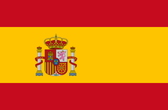
Call 0330 880 3600 Calls may be monitored or recorded. Opening Times.
- TRAVEL INSURANCE
- COVID-19 COVER
- More Options
- Help & Advice
- Existing Customers

Call 0330 880 3600 Calls may be monitored or recorded. Opening Times.

Need help?
UK Customer Services0330 880 3600*
Open Monday to Friday 9:00am to 6pm, Saturday 8:30am to 4pm and closed Sundays.
*Calls are recorded for training and quality purposes.

Official name: Kingdom of Spain
Capital city: Madrid
Languages spoken: Spanish (Castilian), Catalan, Basque, Galician
Population: Around 47 million
Currency: Euro (EUR)
Time zone: GMT+
Driving side: Right
Climate: Mediterranean on the coast, continental inland, oceanic in the north, semi-arid in the southeast
Spain is one of Europe’s most visited countries, celebrated for its cultural vibrancy, regional diversity, and year-round sunshine. Visitors can wander through Gaudí’s architecture in Barcelona, enjoy tapas in Madrid, or soak up Moorish history in Granada and Seville. The country’s lively fiestas, flamenco, and football culture add to its global reputation as a destination full of energy and colour. The Balearic and Canary Islands offer a different pace, with beach resorts, volcanic landscapes, and warm climates that attract millions of holidaymakers every year.
Travellers should note that demonstrations linked to political and economic issues sometimes occur in major cities and regions such as Catalonia. While usually peaceful, they may cause disruption to public transport and city services, so avoiding large gatherings is sensible. Petty crime like pickpocketing is common in tourist hotspots such as Barcelona, Madrid, and the Costa del Sol. Staying alert in crowded places and keeping valuables secure is strongly recommended.
Spain occupies most of the Iberian Peninsula, bordered by Portugal to the west and France and Andorra to the north, with Gibraltar at its southern tip. It also encompasses the Balearic Islands in the Mediterranean and the Canary Islands in the Atlantic. The Pyrenees form a natural northern border, while central Spain is dominated by the Meseta Central plateau. This geographic variety creates a nation of contrasting landscapes, from alpine peaks to semi-desert plains and long stretches of Mediterranean coastline.
Spain is well connected by air, rail, and road. International airports in Madrid, Barcelona, Málaga, Alicante, Palma de Mallorca, and Tenerife serve millions of passengers annually. A modern high-speed train network (AVE) links Madrid with Seville, Valencia, and Barcelona in just a few hours, while regional buses cover even remote villages. Visitors can explore world-famous attractions such as the Alhambra, Santiago de Compostela Cathedral, Seville’s Alcázar, and Bilbao’s Guggenheim Museum. Outdoor enthusiasts will find excellent hiking in the Picos de Europa, skiing in the Sierra Nevada, and surfing along the Basque coast.
As a member of the Schengen Area, Spain allows UK nationals to enter visa-free for up to 90 days in any 180-day period. Passports must be valid for at least three months beyond departure. The British Embassy is located in Madrid, with consulates in popular tourist areas such as Barcelona, Málaga, Alicante, and the Canary Islands, offering strong support for UK visitors.
The euro (EUR) is the official currency. Credit and debit cards are widely accepted in hotels, restaurants, and shops, and ATMs are easy to find. Contactless payment is very common. While tipping is not obligatory, rounding up a bill or leaving around 5–10% in restaurants is appreciated, especially in more formal settings.
Spain has an excellent healthcare system, ranked among the best in Europe. UK travellers can access emergency public healthcare using a GHIC or EHIC, though private healthcare may be quicker and more comfortable, so comprehensive travel insurance is recommended. Pharmacies are widespread and can advise on minor medical needs. Tap water is safe to drink in most regions, though some visitors prefer bottled water in coastal and rural areas due to taste rather than safety. Summer heatwaves can pose a risk — staying hydrated and taking precautions against sun exposure is important.